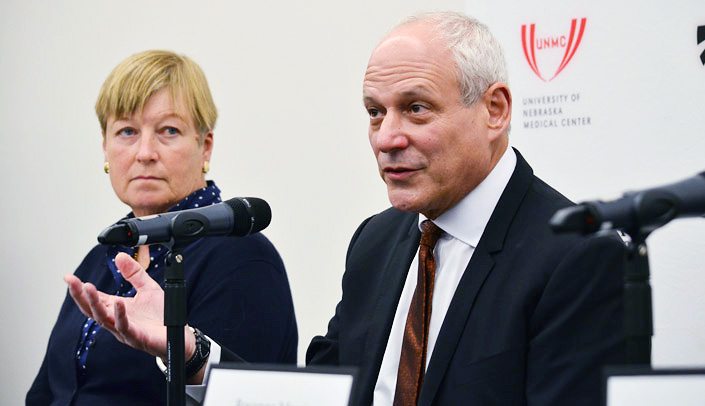The parents of freelance photographer Ashoka Mukpo, the second Ebola patient to be treated at the med center’s Biocontainment Unit, spoke with reporters at the med center Monday morning, shortly after their son had arrived in Omaha.
Mitchell Levy, M.D., Mukpo’s father, said that his son looked strong and that his symptoms were not yet advanced.
Mukpo landed at a remote area at Eppley Aiefield Monday morning and was transported to the med center, where his family spoke to him via video link shortly before the news conference.
“It was an enormous relief to see his face,” said Diana Mukpo, his mother. “We’re really happy that his symptoms are not extreme yet.”
Dean of the UNMC College of Public Health Ali Khan, M.D., M.P.H., Bradley Britigan, M.D., dean of the UNMC College of Medicine and president of the clinical enterprise, and Rosanna Morris, chief nursing officer and chief operating officer, joined Mukpo’s parents at the podium.
Dr. Levy said his son may have become infected in Liberia when he was splashed while helping clean and disinfect a vehicle in which an Ebola patient had died, but that Ashoka Mukpo was not certain.
Dr. Levy described his son as “very strong-willed and determined,” and both parents said they had tried to dissuade their son from returning to Liberia in September in the face of the Ebola epidemic.
“I’m proud of him, but at the same time, I would prefer he went somewhere safer,” Dr. Levy said.
Dr. Britigan said treatment for Mukpo would be individualized and that all treatment options were being considered. He added that treating Rick Sacra, M.D., earlier this year had provided useful experience for the Biocontainment Unit team and also led to some system improvements, such as modifying laboratory procedures to make them more efficient and safe.
Dr. Khan noted that the med center team is in constant communication with other medical teams, not only nationally but worldwide, to maximize efforts to battle Ebola.
UNMC Chancellor Jeffrey P. Gold, M.D., said the med center was proud to offer assistance to Mukpo.
“We have again been called upon at a time when many are fearful,” he said.
He said Mukpo and his family could expect a “signature dose of Nebraska niceness and hospitality.”
The med center’s Biocontainment Unit was created in 2005 to safely handle infectious diseases. Dr. Khan noted that the Biocontainment Unit team has trained and drilled many times to effectively protect the patient, health care workers and the community.

During the press conference, Dr. Khan stated that the virus can be transmitted, even after someone has recovered from Ebola, through semen and breast milk. For how long is that possible? If someone gets infected that way, is the virus dormant for the 10 years or can they become ill right away?
Dr. Khan responds:
"There is a small risk of transmission of Ebola from sexual intercourse or breast milk ingestion from a recovered patient. However there are rare clear epidemiologically linked cases. The virus could be in semen for up to 7 weeks.
"There is no reason to suspect that disease would be any different based on how you get the infection and NO reason to think that Ebola would be latent in your body for 10 years. The 10 years refers to how long people are likely protected from Ebola after they recover."
Thank you so much for the response and clarification, I appreciate it!